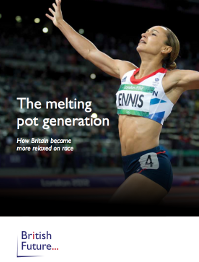The melting pot generation: How Britain became more relaxed on racePosted in Census/Demographics, Identity Development/Psychology, Politics/Public Policy, Reports, Social Science, United Kingdom on 2012-12-13 04:33Z by Steven |
The melting pot generation: How Britain became more relaxed on race
British Future
2012-12-12
26 pages
Rob Ford, Lecturer in Politics
University of Manchester
Rachael Jolley, Editorial Director and Director of Communications
British Future
Sunder Katwala, Director
British Future
Binita Mehta, Intern
British Future
As the 2011 census results show an ever larger number of Britons from mixed race backgrounds, this new British Future report The Melting Pot Generation: How Britain became more relaxed about race examines how these changes might affect the way that we think about race and identity.
When the parents of Olympic champion Jessica Ennis, who are from Jamaica and Derbyshire, met in Sheffield in the 1980s, a majority of the public expressed opposition to mixed race relationships. In 2012, concern has fallen to 15%—and just one in twenty of those aged 18–24. Jessica Ennis is from a generation that worry less about race and mixing than their parents did, and who mostly see mixed Britain as the everyday norm that they grew up with.
Inside this report…
- Rob Ford of the University of Manchester traces how the rise of mixed Britain changed attitudes over recent decades;
- Rachael Jolley explores new Britain Thinks polling on what we think about race and relationships today.
- New Oxford University research reports how media coverage of Olympic medal winners Jessica Ennis and Mo Farah balanced their ethnic origins and local identities.
- Binita Mehta selects ten twenty-something stars who reflect the changing face of their generation.
- Andrew Gimson talks to young Britons about how far being mixed race mattered to their experience of growing up.
- Leading thinkers assess the opportunities and pitfalls of changing how we talk about race.
- Sunder Katwala wonders if his children’s generation will see racial identity as increasingly a matter of choice.
Read the entire report here.


